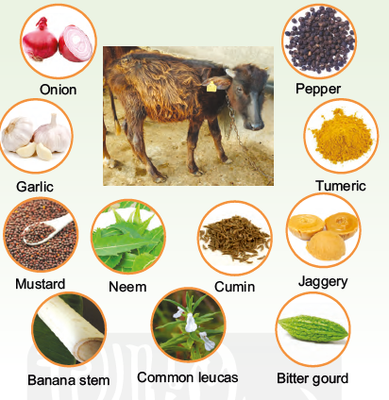VETERINARY AYURVEDA FOR MANAGEMENT OF BOVINE MASTITIS
Dr. N. Krishnaveni
Assistant Professor,
Department of Veterinary Surgery and Radiology,
Veterinary College and Research Institute, Tirunelveli
Tamilnadu Veterinary and Animal Sciences University
Introduction
Ethnoveterinary medicine, the scientific term for traditional animal health care, encompasses the knowledge, skills, methods, practices, and beliefs about animal health care found among the members of a community (McCorkle, 1986). The traditional knowledge of animal husbandry is an integral part of the community which plays an important role in socio-religious, economic and development role in the upliftment of the community. The folk health practices largely remain undocumented and are passed on from one generation to the other by word of mouth. The Ethnoveterinary systems are eco-systems and ethnic community specific and therefore the characteristics, sophistication and intensity of these systems differ greatly among individuals, societies and regions. These local veterinary health practices are accessible, affordable and culturally acceptable (Kempanna et. al., 2018). Ethnoveterinary knowledge and local veterinary practices is gaining attention in recent years in developing countries. Ayurveda for animals/Veterinary Ayurveda is aimed to maintain and promote the health, alleviate the pain and prevent ailments.
Sthanavidhrathi/Mastitis
Mammary gland consists of skin, connective tissues, muscle, lactiferous ducts, glandular lobes and adequate blood vessels. Affection of all these components results in mastitis. Mastitis is inflammation of the parenchyma of the mammary gland it is characterized by a range of physical and chemical changes in the milk and pathological changes in the glandular tissue. The most important changes in the milk include discolouration, the presence of clots and the presence of large number of leukocytes.
Clinical features
- Swelling, pain, inflammation , tenderness, fever, reduction in milk yield
Principles of Treatment
- Improve enzymatic activity
- Metabolize the end toxins
- Clean the wound
- Pacifies the inflammation due to infection
- Decrease the microbial load
Ayurvedic formulation for mastitis/ Sthanavidhrathi
- Aloe vera L. (Kumari),
- Curcuma longa L. (Haridra)
- calcium hydroxide (Chunnam)
Aloe vera L. (Kumari) is a wonder herb, having healing properties from the skin to reproductive. It has digestive, carminative, anti-microrbial and anti-inflammatory properties. It cleans the wound and pacifies the inflammation due to infection.
Curcuma longa L. (Haridra)/ (Turmeric root) is an herb used in Indian culinary purpose. It improves the enzymatic activity, purifies the blood and removes the toxins. It has properties of antimicrobial and anti-inflammatory.
Calcium hydroxide pacifies the inflammation due to infection, clean the wound and alleviate the pain and swelling. Hence, this formulation is effective against mastitis.
Other medicines
- Application of root of Citrullus colocynthis (Bitter apple fruit) relieves pain
- Application of Curcuma longa L. and Datura metal cures immediately
- Heated iron should be dipped in water. Drinking these water cures pain immediately
Conclusion
In this article, it is tried to explain ethno and Ayurvedic understanding of the most economically devastating disease mastitis. This ayurvedic formulation can be used along with the routine mastitis treatment in veterinary practice.
References
Kempanna, K. S., B. N. Mannoor Narayanan, N. Punniamurthy and G.K. Ventakeshappa.(2018). Ayurveda understanding of mastitis in dairy animals. J Ayu Med Sci. 3 (2): 351-355.
McCorkle, C.M. (1896). An introduction to Ethnoveterinary Research and development. J Ethnobiol. 1986: 129-149.


